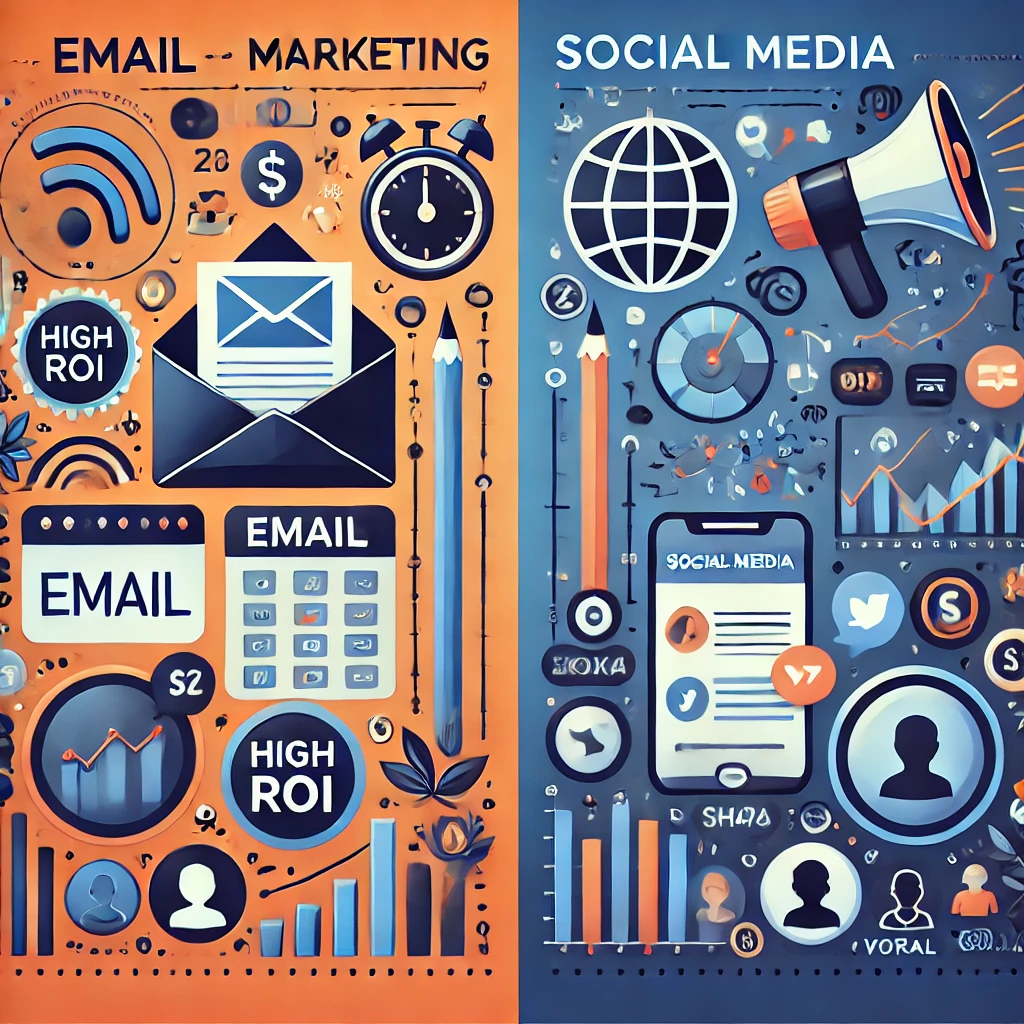In today’s digital age, businesses are constantly seeking the most effective ways to connect with their audience, build relationships, and drive conversions. Among the most popular strategies are email marketing and social media marketing. But which one is better for your business? The answer isn’t straightforward—it depends on your goals, audience, and resources. Let’s explore the strengths and weaknesses of both to help you make an informed decision.
The Power of Email Marketing
1. Direct Communication: Email marketing offers a direct line to your audience’s inbox. Unlike social media, where your content competes with countless other posts, emails are personal and tailored to the recipient. This direct communication fosters a closer relationship between your brand and your customers.
2. High ROI: Email marketing consistently delivers one of the highest returns on investment (ROI) among digital marketing strategies. According to various studies, for every dollar spent on email marketing, businesses can expect an average return of $42. This high ROI is due in part to the low cost of sending emails and the effectiveness of targeted campaigns.
3. Targeted Campaigns: Email marketing allows for precise targeting based on customer behavior, preferences, and demographics. This level of personalization can significantly improve engagement rates. Segmented email campaigns, for example, have been shown to result in higher open and click-through rates.
4. Ownership of Contact Lists: With email marketing, you own your contact list. Unlike social media platforms, where algorithms control who sees your content, email ensures that your messages reach your subscribers directly. This ownership reduces the risk of losing touch with your audience due to platform changes or restrictions.
5. Versatility and Automation: Email marketing is versatile, supporting various types of content—from newsletters and promotional offers to personalized recommendations and transactional emails. Automation tools further enhance efficiency, allowing businesses to set up drip campaigns, trigger-based emails, and more, without manual intervention.
The Influence of Social Media Marketing
1. Broad Reach and Visibility: Social media platforms like Facebook, Instagram, LinkedIn, and Twitter offer unparalleled reach. With billions of active users, these platforms provide businesses with the opportunity to reach a global audience. Social media marketing is particularly effective for brand awareness, community building, and engaging with customers in real-time.
2. Viral Potential: One of the unique advantages of social media is the potential for content to go viral. A well-crafted post or campaign can be shared and reshared, exponentially increasing its reach. This virality can drive significant traffic and boost brand visibility overnight.
3. Engagement and Interaction: Social media is inherently social. It allows for two-way communication between brands and customers, fostering a sense of community and loyalty. Businesses can engage with their audience through comments, direct messages, polls, and live videos, making it an ideal platform for building relationships and gathering feedback.
4. Targeting Capabilities: Social media platforms offer sophisticated targeting options based on demographics, interests, behaviors, and more. Paid social media campaigns can be tailored to reach specific audiences, ensuring that your message gets in front of the right people at the right time.
5. Content Diversity: Social media supports a wide range of content types, including text, images, videos, stories, and live streams. This diversity allows businesses to experiment with different formats and engage their audience in various ways. Social media is also a hub for user-generated content, which can enhance brand credibility and authenticity.
Which is Better for Your Business?
The choice between email marketing and social media marketing depends on your business goals:
- For Building Relationships: If your primary goal is to build long-term relationships with customers, email marketing may be more effective due to its personalized nature and direct communication.
- For Brand Awareness: Social media marketing excels at increasing brand visibility and engaging with a broad audience. If your focus is on reaching new customers and growing your brand, social media may be the better option.
- For Driving Conversions: Both email and social media can drive conversions, but email marketing’s targeted approach often results in higher conversion rates. However, social media’s ability to engage users in real-time can also lead to significant conversions, especially with the right call-to-action.
- For Budget Considerations: Email marketing generally offers a higher ROI, but social media marketing can be cost-effective when aiming for broad reach and engagement. Consider your budget and where you can achieve the best returns.
In many cases, a combination of both strategies is the most effective approach. By integrating email marketing and social media marketing, businesses can leverage the strengths of each platform, creating a comprehensive marketing strategy that maximizes reach, engagement, and conversions.
Conclusion
Ultimately, the decision between email marketing and social media marketing isn’t about choosing one over the other. Instead, it’s about understanding how each can serve your business goals and how they can complement each other. By carefully considering your audience, objectives, and resources, you can create a marketing strategy that leverages the best of both worlds.
Whether you’re nurturing leads through personalized emails or expanding your brand’s reach on social media, the key is to stay adaptable and responsive to your audience’s needs. In the dynamic digital landscape, a balanced and integrated approach often yields the best results.



